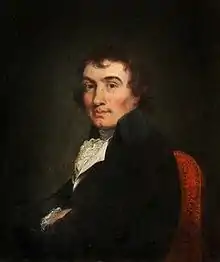Alexander Abercromby (British Army officer)
Colonel Alexander Abercromby CB (4 March 1784 – 27 August 1853) was a senior British Army officer during the Napoleonic Wars. He also served for a short time as a Member of Parliament for Clackmannanshire.
Alexander Abercromby | |
|---|---|
 Alexander Abercromby | |
| Born | 4 March 1784 |
| Died | 27 August 1853 (aged 69) |
| Service/ | British Army |
| Years of service | 1799–1815 |
| Rank | Colonel |
| Commands held | 28th Regiment of Foot Coldstream Guards |
| Battles/wars | |
| Awards |
|
| Relations | Sir Ralph Abercromby (father) Sir John Abercromby (brother) |
| Other work | MP for Clackmannanshire (1817–1818) |
Biography
Alexander Abercromby was the youngest son of Sir Ralph Abercromby, a British lieutenant-general noted for his services during the Napoleonic Wars and Mary Abercromby, 1st Baroness Abercromby.[1] Born on 4 March 1784,[2] Abercromby entered the army at an early age, and served as a volunteer with the 92nd Regiment in the expedition to the Helder in 1799. He soon obtained a commission, and saw service with his regiment in Egypt. He was appointed aide-de-camp to his father's old lieutenant and friend, Sir John Moore, during his command in Sicily in 1806, but was not with him in Spain.[1]
Like his brother, Sir John, he was rapidly promoted, and in 1808, when only twenty-four, became lieutenant-colonel of the 28th Regiment. He accompanied his regiment when it was sent to Portugal to reinforce Lord Wellesley after the battle of Talavera. He commanded it at the battle of Busaco, and in the lines of Torres Vedras, and as senior colonel had the good fortune to command his brigade at the battle of Albuera. His services there were very conspicuous, and his brigade has been immortalised by Napier. He was soon superseded, but commanded his regiment at the surprise of Arroyo de Molinos and the storming of the forts at Almaraz.[1]
In 1812 he was removed to the staff of the army, and was present as assistant-quartermaster-general at the battles of Vittoria, the Pyrenees, and Orthes. He served in the same capacity in 1815, and was present at Quatre-Bras, Waterloo, and the storming of Péronne.[1]
For his active services he was promoted to a colonelcy in the 2nd or Coldstream Guards, and made a companion of the Bath, a knight of the order of Maria Theresa of Austria, of the Tower and Sword of Portugal, and of St. George of Russia. He was returned to parliament in the Whig interest in 1817 for the county of Clackmannan in place of his brother Sir John, but retired next year. He was in command of the 2nd Guards, but retired on half-pay when there seemed to be no chance of another war, and died at his country seat in Scotland on 27 August 1853.[1][2] He had no small share of the military ability of his family, and was an admirable regimental and staff officer; but the long peace which followed the battle of Waterloo gave him no opportunity to show whether he had his father's ability to command an army.[1]
Honours
- Companion of the Order of the Bath (1815)
- Knight of the Order of the Tower and Sword
- Knight of the Military Order of Maria Theresa
- Fourth Class, Order of St. George
Notes
- Stephens 1885, p. 39.
- Portrait 2013.
References
- "Portrait of Col. Hon Alexander Abercromby, Coldstream Guards circa 1805". themilitarygentleman.com. 2013. Retrieved 24 June 2013.
Attribution
 This article incorporates text from a publication now in the public domain: Stephens, Henry Morse (1885). "Abercromby, Alexander (1784-1853)". In Stephen, Leslie (ed.). Dictionary of National Biography. Vol. 1. London: Smith, Elder & Co. p. 39.
This article incorporates text from a publication now in the public domain: Stephens, Henry Morse (1885). "Abercromby, Alexander (1784-1853)". In Stephen, Leslie (ed.). Dictionary of National Biography. Vol. 1. London: Smith, Elder & Co. p. 39.